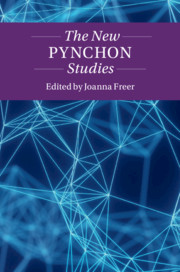33 results
Matthew Mullins (ed.), Postmodernism in Pieces: Materializing the Social in U.S. Fiction (Oxford: Oxford University Press, 2016, $92.00). Pp. 248. isbn 978 0 1904 5950 5.
-
- Journal:
- Journal of American Studies / Volume 54 / Issue 5 / December 2020
- Published online by Cambridge University Press:
- 16 November 2020, E68
- Print publication:
- December 2020
-
- Article
- Export citation
Chapter 21 - Politics and Counterculture
- from Part II - Culture, Politics, and Society
-
-
- Book:
- Thomas Pynchon in Context
- Published online:
- 31 May 2019
- Print publication:
- 20 June 2019, pp 172-179
-
- Chapter
- Export citation

The New Pynchon Studies
-
- Published online:
- 09 May 2019
- Print publication:
- 09 May 2019
Part 2 - Politics
-
- Book:
- The New Pynchon Studies
- Published online:
- 09 May 2019
- Print publication:
- 09 May 2019, pp 87-172
-
- Chapter
- Export citation
Part 1 - Theory
-
- Book:
- The New Pynchon Studies
- Published online:
- 09 May 2019
- Print publication:
- 09 May 2019, pp 15-86
-
- Chapter
- Export citation
Chapter 6 - Pynchon, Gender, and Relational Ethics
- from Part 2 - Politics
-
-
- Book:
- The New Pynchon Studies
- Published online:
- 09 May 2019
- Print publication:
- 09 May 2019, pp 89-108
-
- Chapter
- Export citation
Part 3 - Analysis
-
- Book:
- The New Pynchon Studies
- Published online:
- 09 May 2019
- Print publication:
- 09 May 2019, pp 173-240
-
- Chapter
- Export citation
Copyright page
-
- Book:
- The New Pynchon Studies
- Published online:
- 09 May 2019
- Print publication:
- 09 May 2019, pp iv-iv
-
- Chapter
- Export citation
Index
-
- Book:
- The New Pynchon Studies
- Published online:
- 09 May 2019
- Print publication:
- 09 May 2019, pp 259-262
-
- Chapter
- Export citation
Notes on Contributors
-
- Book:
- The New Pynchon Studies
- Published online:
- 09 May 2019
- Print publication:
- 09 May 2019, pp viii-xii
-
- Chapter
- Export citation
Note on the Texts
-
- Book:
- The New Pynchon Studies
- Published online:
- 09 May 2019
- Print publication:
- 09 May 2019, pp vii-vii
-
- Chapter
- Export citation
Chapter 1 - Introduction: Pynchon Studies in the Twenty-First Century
-
-
- Book:
- The New Pynchon Studies
- Published online:
- 09 May 2019
- Print publication:
- 09 May 2019, pp 1-14
-
- Chapter
- Export citation
Bibliography
-
- Book:
- The New Pynchon Studies
- Published online:
- 09 May 2019
- Print publication:
- 09 May 2019, pp 241-258
-
- Chapter
- Export citation
Contents
-
- Book:
- The New Pynchon Studies
- Published online:
- 09 May 2019
- Print publication:
- 09 May 2019, pp v-vi
-
- Chapter
- Export citation
Robert C. Cottrell , Sex, Drugs, and Rock ’n’ Roll: The Rise of America's 1960s Counterculture (New York: Rowman & Littlefield, 2015, £24.95). Pp. 452. isbn 978 1 4422 4606 5.
-
- Journal:
- Journal of American Studies / Volume 50 / Issue 3 / August 2016
- Published online by Cambridge University Press:
- 30 June 2016, E51
- Print publication:
- August 2016
-
- Article
- Export citation
Chapter 5 - Feminism Moderate and Radical inThe Crying of Lot 49andVineland
-
- Book:
- Thomas Pynchon and American Counterculture
- Published online:
- 05 September 2014
- Print publication:
- 22 September 2014, pp 126-156
-
- Chapter
- Export citation
Conclusion - A “Little Parenthesis of Light”
-
- Book:
- Thomas Pynchon and American Counterculture
- Published online:
- 05 September 2014
- Print publication:
- 22 September 2014, pp 157-166
-
- Chapter
- Export citation
Bibliography
-
- Book:
- Thomas Pynchon and American Counterculture
- Published online:
- 05 September 2014
- Print publication:
- 22 September 2014, pp 191-202
-
- Chapter
- Export citation
Chapter 3 - The Psychedelic Movement, Fantasy, and Anarchism inThe Crying of Lot 49andAgainst the Day*
-
- Book:
- Thomas Pynchon and American Counterculture
- Published online:
- 05 September 2014
- Print publication:
- 22 September 2014, pp 65-101
-
- Chapter
- Export citation
Introduction
-
- Book:
- Thomas Pynchon and American Counterculture
- Published online:
- 05 September 2014
- Print publication:
- 22 September 2014, pp 1-13
-
- Chapter
- Export citation



